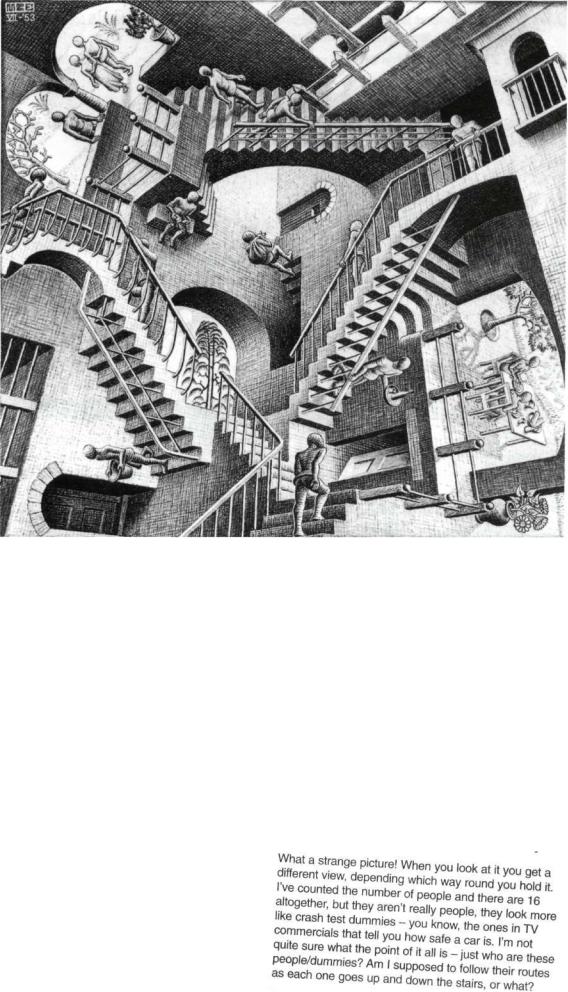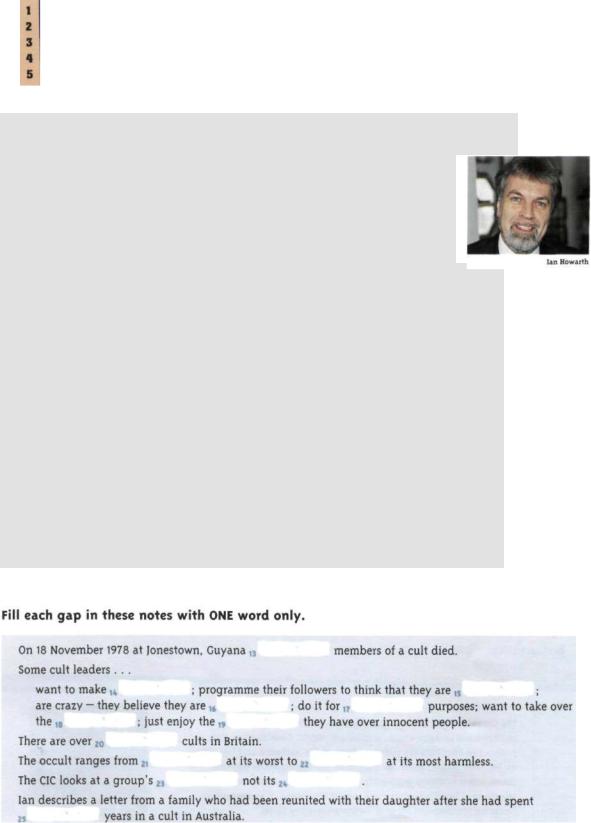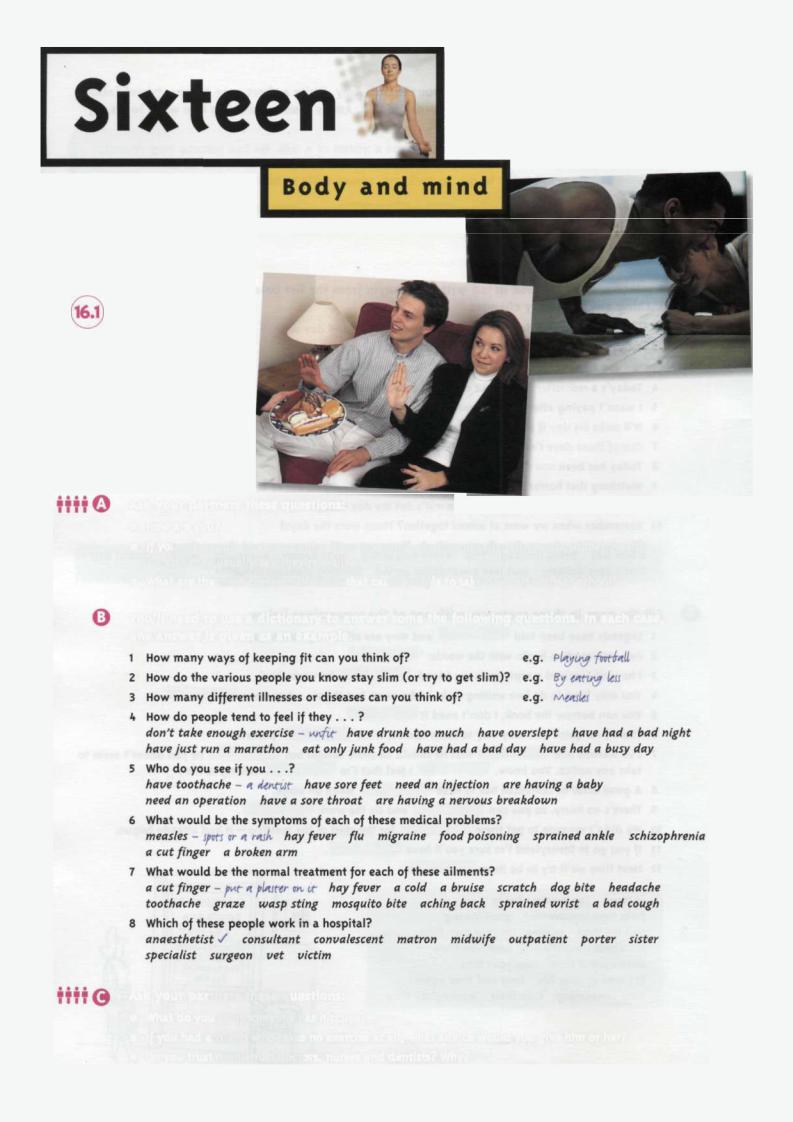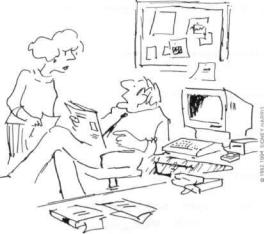
English_books / New Cambridge Advanced
.pdf



New Cambridge Advanced English
INHUMAN NATURE
I try to be the best person I can be, but I'm constantly letting myself down. Human nature is largely something that has to be overcome. Lots of the little things in life that give me pleasure are usually connected with someone else's misfortune. Not big misfortunes, not even misfortunes, more inconveniences; little victories in my life that keep me going. Before you start to hate me, let me give you a few examples and see if they sound familiar.
1 You're standing on line for a very popular movie. You're warned about whether or not you will get in. You wait ten minutes. You turn around. You are no longer at the end of the line. There are now at least thirty people behind you who have less chance of getting in than you do, and if they do, you will almost certainly get a better seat. What is your reaction? Do you say to the people behind you, "Hey, you can all get in front of me, I can see this movie tomorrow night." No, you gloat - admit it, you gloat... or am I the only one?
2I'm staying in a hotel, and while walking down the corridor I always peek in other people's hotel rooms to see if they are nicer than mine. If their room is nicer, I rationalize to myself, "It's just a room, I'm going to be sleeping in it most of the time." However, if my room is nicer, I think, "Ha ha, I got a better room, ha, ha, ha, ha, ha, ha, ha, ha." I revert to a three-year-old and say "ha" far too many times.
3We all know that life isn't fair; but restaurant service should be. When I sit down at a restaurant and the people who sit down fifteen minutes after me get served first, I'm furious, unless I'm the later person who has gotten served. I don't wait and say "I'm not eating until the people who got here before me are taken care of." I eat. I eat, and it's especially delicious.
4There are few things that have given me more joy than Geraldo Rivera [see below] being hit in the nose by a chair. It still gives me the giggles when I think about the bandage. I don't like Geraldo Rivera, but I would never wish him harm. I just think it's the chair that makes the image special. A fist would have been too common and a blender too disturbing, but a chair and a nose coming together when the nose belonged to Geraldo Rivera, that was a delight.
5This is something that must not go farther than this book. Sometimes, when I'm in an elevator and I see someone running toward it, I . . . I . . . I pretend I can't find the Open Door button. There, I said it. It has nothing to do with the character of the person who wants to come in. I don't even particularly want to be alone. I just don't want to press the button.
6When I'm driving down the street and see someone else fixing a flat tire, I sit a little taller. I know someday that will be me out there, but it hasn't happened yet, so I'm still able to chuckle.
7In traffic there is only one rule that is a constant. The lane of traffic that you are in is the lane of traffic that isn't moving. If I were in the lane of traffic that was moving, I'm sure I would be happy about it, but this personally has never happened to me.
8I'm in the movie theater, a woman with an enormous head sits down directly in front of the person sitting next to me. I am amused, but only for a few seconds before she changes her mind and sits directly in front of me.
9 One of my very best friends who has never been able to gain weight (poor thing) recently gained ten pounds and had to go on a diet. Glee. I call her and laugh and hang up. (She does deserve it; all those years of complaining to me about the horrors of having to drink a chocolate shake every day.)
10 My husband found a gray hair on his head. He was upset. I had it framed.
There are more things about myself that I'm ashamed of but I'm going to stop here, just in case it's not really human nature... and I'm the only one.
from Naked Beneath My Clothes by Rita Rudner
The Geraldo Rivera Show is a US daytime talk show focusing on controversial and sometimes unpleasant topics. Geraldo often tries to provoke or humiliate his guests in front of the audience and this often makes them angry. There are dozens of less controversial daytime shows where ordinary people are famous for five minutes on television, often for having done something stupid or embarrassing. The most successful of these is the Oprah Winfrey Show.

Мind control
Listening and Creative writing
Before you listen to the interview, read this definition of a cult and then discuss the questions below.
The Cult Information Centre (CIC) defines a cult as a group having all of the following five characteristics:
It uses psychological coercion to recruit and indoctrinate potential members ("mind control"). It forms an elitist totalitarian society.
Its founder leader is self-appointed, dogmatic, messianic, not accountable and has charisma. It believes "the end justifies the means" in order to solicit funds or recruit people.
Its wealth does not benefit its members or society.
•How does a bona fide religion seem to be different from a cult, as defined above?
•What kind of people might be vulnerable to cults? What kind of people might be recruited?
•What cults have been in the news recently?
You'll hear an interview with Ian Howarth, General Secretary of the Cult Information Centre.
Listen to the first part of the interview and complete these sentences with ONE word only.
Ian is concerned with a group's methods not its 1
The woman who approached Ian in Toronto was 2
She appeared to be doing some sort of 3
What the main speaker at the first meeting said seemed to be 4
He was approached by another woman when he left the room for a 5
The apparent purpose of the course was to help him to stop 6
Two and a half weeks later he read a(n) 7 |
|
about the group. |
||
Luckily, the group had failed to 8 |
him against the media. |
|||
Cults tell their members that the media is full of 9 |
or run by the t0 |
|||
It took him |
11 |
months to recover. |
|
|
Listen to the second part of the interview and fill the gaps.
1 2 |
What kind of people are |
recruited by |
cults? Note down FOUR qualities or characteristics of |
a |
typical recruit, using a |
word or short |
phrase: |

New Cambridge Advanced English
Read this extract from a letter from your friend, Amy. Write a short note to your friend (about 50 words) and a letter (about 200 words) to Tim, Amy's cousin, advising him what to do.
I'm afraid my cousin Tim may have become a victim of a cult. He has become very friendly with a woman he met at a cafe and she has persuaded him to go with her to several meetings. He won't listen to me, so could you please write to him?
Day and time
Idioms and collocations
Replace each expression in red with a synonym from the list below, making any necessary changes.
1 She hates having to do the same boring chores day in and day out.
2OK that's enough, I think we'd better call it a day.
3'Do you think you'll be boss one day?' 'Haha, that'll be the day!'
4Today's a red-letter day: I take delivery of my new car this afternoon.
5I wasn't paying attention because I was daydreaming about my holiday
6It'll make his day if she agrees to go out with him.
7 One of these days I'm going to go into my boss's office and tell her what I really think of her.
8Today has been one of those days I'm afraid.
9Watching that horror film on video scared the living daylights out of him. 10 I'm sorry I've made another mistake - it's not my day today.
11 Remember when we were at school together? Those were the days!
a bad day being unlucky stop every single day |
make happy eventually terrify special day |
that's very unlikely that was a wonderful period |
thinking pleasant thoughts |
Fill the gaps in these sentences with one of the expressions below.
1 |
Legends have been told |
and they are still being told today. |
|
2 |
Folk stories often begin with the words: ' |
. . .' |
|
3 |
I haven't received a reply from my friend, |
he wrote back. |
|
4You only have to do two writing tasks in the exam but there's a two-hour
5You can borrow the book, I don't need it
6 |
There's no quick and easy way to learn idioms, it's a |
process. |
|||||
7 |
I've warned him |
|
|
that he should be more careful but |
he just doesn't seem to |
||
|
take any notice. You know, |
|
I feel that I'm |
talking to him. |
|||
8 |
A good actor or comedian has to have |
|
when on stage. |
||||
9 |
There's no hurry, so you can |
|
and do the work |
. |
|||
10 |
We didn't manage to get there |
for the start of the meeting - it had already begun. |
|||||
11 |
If you go to Disneyland I'm sure you'll have |
|
|||||
12 |
Next time we'll try to be there |
|
|
|
*= |
||
|
|
|
|
|
|
||
|
at times for the time being |
|
|
|
|
||
|
from time immemorial |
good timing |
|
|
|
||
|
half the time in time |
in your own time |
|
|
|
||
|
it's about time/it's high time |
on time |
|
|
|
||
|
once upon a time |
take your time |
|
|
|
||
|
the time of your life |
time and time again |
|
|
|
||
|
time-consuming |
time limit |
wasting my time |
|
|
||
|
|
|
|
|
|
|
|

How arc you?
Vocabulary
and Listening
Ask your partners these questions:
•How are you?
•If you ask people in your country 'How are you?', do they usually tell you about their health
-or do they usually say they're well?
•What are the most common illnesses that cause people to take days off work or school?
You'll need to use a dictionary to answer some the following questions. In each case, one answer is given as an example.
Ask your partners these questions:
•What do you do if someone has hiccups?
•If you had a friend who takes no exercise at all, what advice would you give him or her?
•Do you trust or mistrust doctors, nurses and dentists? Why?



New Cambridge Advanced English
Spelling
Word study
1 Read the first part of this article and then discuss the questions below.
Mirror, mirror
THESE drugs are meant to make you better. Not "well", you understand, but better - more attentive, more attractive, better in bed. Already many such drugs are being worked on in laborataries. The first to be released could be Johnson & Johnson's anti-wrinkle drug, called Renova, which is now awaiting regulatory approval. Such treatments - part drug, part cosmetic - have even been given their own name: "cosmeceuticals". These hybrids are a puzzle for regulators, for they fall under no definate rules. Until that is put right, the cosmeceutical industry cannot make money or, incidentally, enhance humanity.
The term "cosmeceutical" was coined in 1990 when the cosmetics industry had a brush with America's Food and Drug Administration (FDA). The FDA thought that sunscreen and sun-tanning lotions should be classified as drugs and subjected to rigorous tests. While cosmetics need be tested only for safety, drugs are actually required to work as described. Any product making a medical claim is, legally, a pharmaceutical.
•There were three spelling mistakes in the text - did you spot them?
•What's your opinion of people who use 'cosmeceuticals'?
•If there was a drug you could take to enhance your memory or help you to concentrate better, would you consider using it? Why/Why not?
2Now read the continuation of the article. In most lines there is one spelling error. Write the correctly spelled word on the right, or put a tick if there are no mistakes.
o |
Unfortunately, when it came to cosmeceuticals, nobody could agree what was |
00 |
meddical and what cosmetic. So it was proposed in 1990 that these chemicals should be |
1 |
in a category of their own - potent biological substences that do not seem to treat any |
2 |
disease - and that new rules should be drafted to deal with them. So far none has been. |
3 |
If Renova is approved, it will therfore have to be sold as a pharmaceutical rather |
4 |
than as a cosmetic. The disease it will be prescribed to treat is "apearance of fine |
5 |
wrinkling roughnes and hyper-pigmentation all associated with photo-damaged skin" |
6(i.e. ageing). The absurdity is that Avon last year lunched a new potion that does much
7the same thing, but got it approved as a cosmetic.
8Regulaters willing to call products designed to rejuvenate "pharmaceuticals"
9nevertheless seem reluctant to regard memory-enhancers in the same way - even
10through memory-loss, like skin damage, is generally caused by ageing rather than
11ilness. Doctors have tried to devise a loophole - "age-associated memory-impairment
12disease", or AAMI - which they diganose in anybody over 50 not suffering from a
13mental disorder, but complaning of forgetfulness. AAMI has yet to gain official
14recognition.
15After this regulatory mess has ben sorted out, the cosmeceutical industry could
16be huge. Acording to Kline and Company, a consultancy based in New Jersey, new anti-
17aging lotions have helped boost 1992 sales of facial treatments in America by 7%, to $1.2
18billion. (That compairs with a rise of just 1-2% for other cosmetics.) As consumers
19grow elder, they want pills and ointments that will improve their health, fitness and
20 |
appearance - and it seems they are going to get them. |
